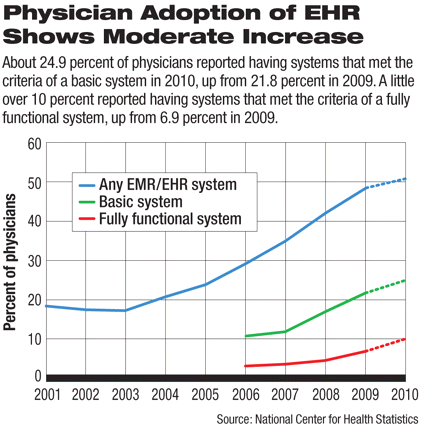Physician EHR Use Gains Steam, but Psychiatrists Slow Adopters
Abstract
Adoption of electronic health records (EHR) by physicians appears to be increasing after a very slow start, according to data recently released by the federal government.
Preliminary data on physician adoption of EHRs for 2010 from the National Center for Health Statistics (NCHS) show that 50.7 percent of physicians reported using all or partial EMR/EHR systems last year (see chart). About 24.9 percent reported having systems that met the criteria of a basic system (up from 21.8 percent in 2009), and 10.1 percent reported having systems that met the criteria of a fully functional system (up from 6.9 percent in 2009).

However, a breakdown by specialty indicates that psychiatrists continue to lag behind in adoption, with 6.2 percent meeting criteria for a basic system and 5.8 percent for a full system.
A fully functioning system, as defined by the Centers for Medicare and Medicaid Services (CMS) and in the NCHS survey, is one that fulfills 16 functions, including, among other functions, sending computerized orders for prescriptions, providing warnings about drug interactions or contraindications, and alerting physicians to guideline-based interventions or screening tests. A "basic" system fulfills a shorter list of fundamental functions such as recording patient histories and physician clinical notes (see GAO Urges EHR Program Changes).
Moreover, a substantial percentage of physicians responding to the survey said they intend to adopt an EHR system, with 41 percent of office-based physicians indicating that they intend to take advantage of federal incentive payments for adoption and meaningful use of certified EHR technology.
David Blumenthal, M.D., M.P.P., the government's national coordinator for health information technology, said in a statement released with the survey that the numbers represent a clear reversal of the low interest in EHR adoption found in previous years.
"For years we have known that electronic health records would improve care for patients and bring about greater cost-effectiveness in our health sector, yet adoption rates by health care providers remained low," Blumenthal said. "In 2009, Congress and the president authorized major new federal support for EHR adoption and use, and [did so] in combination with medical professional and hospital leadership. I believe we are seeing the tide turn toward widespread and accelerating adoption and use of health IT."
Data on hospitals' adoption and intended adoption of EHR systems that were reported by the American Hospital Association (AHA) indicated the same upward trend found among physicians. The AHA survey found that about two-thirds of hospitals responded that they will enroll in government-incentive EHR programs in 2011 and 2012.
Registration for providers in the Medicare and Medicaid EHR incentive programs opened on January 3 (though not all states have begun registering Medicaid providers in the program). To qualify for incentive payments under the Medicare part of the EHR incentive program, providers must achieve "meaningful use" of certified EHR technology, under regulations issued by CMS and the Office of the National Coordinator for Health Information Technology.
(According to CMS, the American Recovery and Reinvestment Act of 2009—the Obama administration's stimulus law—specifies three main components of "meaningful use," use of a certified EHR system for e-prescribing, electronic exchange of health information to improve quality of patient care, and submission of data on clinical quality and other measures.)
Psychiatric News has published a number of articles about problems confronting psychiatrists seeking to move to electronic health records. (See "EHRs May Not Be Good Fit for All Psychiatry Practices," November 5, 2010; and "Several Concerns Keep Psychiatrists Wary of Electronic Records," April 16, 2010.)
Laura Fochtmann, M.D., chair of APA's Committee on Electronic Health Records, reiterated for Psychiatric News that the federal government incentive programs are structured in such a way that they are not likely to be attractive to psychiatrists.
"The incentives are linked to accepting Medicare and Medicaid, which is an issue because many clinicians in private practice of psychiatry are not necessarily participating in those programs," she said in an interview. "Additionally, currently most electronic health record systems don't do a good job of supporting the unique practice needs of psychiatrists. And the specific requirements of ‘meaningful use’ tend to be targeted to primary care and include requirements for clinical practices that would not necessarily be a part of a typical psychiatric work flow."
She noted for instance that among the specific requirements for demonstrating "meaningful use" is a system that includes taking vital signs and body weight, activities that may be typical for some psychiatrists but not all.
Moreover, since the incentives are tied to volume of Medicare and Medicaid patients, the actual incentive amounts for clinicians who do seek to comply with the requirements may not be significant enough to offset the costs and time required to invest in the system.
Survey results from NCHS and AHA are posted at <www.cdc.gov/nchs/data/hestat/emr_ehr_09/emr_ehr_09.htm> and <www.ahadata.com/ahadata/html/AHASurvey.html>. Information about "meaningful use" criteria and Medicare and Medicaid incentive programs for EHR adoption is posted at <www.cms.gov/EHRIncentivePrograms/30_Meaningful_Use.asp#BOOKMARK2>. Recent Psychiatric News articles about psychiatry and electronic health records are posted at <http://pn.psychiatryonline.org/content/45/21/8.full> and <http://pn.psychiatryonline.org/content/45/8/6.1.short?rss=1>.



